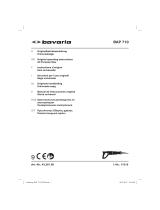
GB
- 16 -
L
pA
sound pressure level ................... 100.2 dB(A)
K
pA
uncertainty .............................................3 dB
L
WA
sound power level ..................... 103.7 dB(A)
K
WA
uncertainty .............................................3 dB
Wear ear-muff s.
The impact of noise can cause damage to hea-
ring.
Total vibration values (vector sum of three direc-
tions) determined in accordance with EN 60745.
Chiseling
Vibration emission value a
h
= 17.044 m/s
2
K uncertainty = 1.6 m/s
2
The specifi ed vibration value was established in
accordance with a standardized testing method. It
may change according to how the electric equip-
ment is used and may exceed the specifi ed value
in exceptional circumstances.
The specifi ed vibration value can be used to
compare the equipment with other electric power
tools.
The specifi ed vibration value can be used for initi-
al assessment of a harmful eff ect.
Keep the noise emissions and vibrations to a
minimum.
•
Only use appliances which are in perfect wor-
king order.
•
Service and clean the appliance regularly.
•
Adapt your working style to suit the appliance.
•
Do not overload the appliance.
•
Have the appliance serviced whenever ne-
cessary.
•
Switch the appliance off when it is not in use.
•
Wear protective gloves.
Caution!
Residual risks
Even if you use this electric power tool in
accordance with instructions, certain resi-
dual risks cannot be rules out. The following
hazards may arise in connection with the
equipment’s construction and layout:
1. Lung damage if no suitable protective dust
mask is used.
2. Damage to hearing if no suitable ear protec-
tion is used.
3. Health damage caused by hand-arm vib-
rations if the equipment is used over a pro-
longed period or is not properly guided and
maintained.
5. Before starting the equipment
Before you connect the equipment to the mains
supply make sure that the data on the rating plate
are identical to the mains data.
Warning!
Always pull the power plug before making
adjustments to the equipment.
Check the drilling point for concealed electrical
cables, gas and water pipes using a cable/pipe
detector.
5.1 Additional handle (Fig. 2 – Item 4)
For safety reasons you must only use the hammer
drill with the additional handle.
The additional handle (4) enables you to achieve
better stability whilst using the hammer drill. For
safety reasons the machine must not be used
without the additional handle (4). The additional
handle (4) is secured to the impact drill by a
clamp. Turning the handle anti-clockwise (viewed
from the handle) will release the clamp. Turning
the handle clockwise tightens the clamp. Release
the clamp of the additional handle fi rst. Then you
can swivel the additional handle (4) into the most
comfortable working position for yourself. Now
turn the additional handle in the opposite direction
again until the additional handle is secure.
5.2 Tool insertion (Fig. 3)
•
Clean the tool before insertion and apply a
thin coating of drill bit grease to the shaft of
the tool.
•
Pull back and hold the locking sleeve (2).
•
Insert the dust-free tool into the tool mounting
as far as it will go whilst turning it. The tool will
lock itself.
•
Check that it is properly secure by pulling the
tool.
5.3 Tool removal (Fig. 4)
Pull back and hold the locking sleeve (2) and re-
move the tool.
5.4 Chisel lock (Fig.5 Item 3)
When the chisel lock (3) is pressed, you can turn
the inserted chisel into the required position.
•
Press the chisel lock (3) towards the inserted
Anl_TE_DH_12_SPK9.indb 16Anl_TE_DH_12_SPK9.indb 16 15.02.2019 06:40:2715.02.2019 06:40:27










